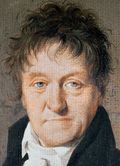 |
Lazare-Nicolas-Marguerite Carnot
b. 13 May 1753, Nolay, Côte-d'Or, France
d. 2 Aug 1823, Magdeburg, Royal Prussian States |
| Title: |
Président du Directoire exécutif de la République française (President of the Executive Directory of the French Republic) |
| Term: |
30 Apr 1796 - 29 Jul 1796 |
| Chronology: |
30 Apr 1796, installed as President, meeting of the Executive Directory, Palais du Luxembourg, Paris [1, vol. 2, p. 260] |
|
29 Jul 1796, expiration of term, successor installed [1, vol. 3, p. 211] |
| Term: |
26 May 1797 - 24 Aug 1797 |
| Chronology: |
26 May 1797, installed as President, meeting of the Executive Directory, Palais du Luxembourg, Paris [2, vol. 1, p. 277] |
|
24 Aug 1797, expiration of term, successor installed [2, vol. 2, p. 181], [3] |
| Names/titles: |
Comte Carnot, comte de l'Empire (count Carnot, count of the Empire) [from 20 Mar 1815] |
|
Président de la Convention nationale (President of the National Convention) (5 May 1794 - 20 May 1794) [see details]; Membre du Directoire exécutif de la République française (Member of the Executive Directory of the French Republic) (4 Nov 1795 - 5 Sep 1797) [see details] |
| Biography: |
| Son of a Nolay notary, who had 18 children; entered the Collège d'Autun (1765), where he was educated together with Joseph and Lucien, brothers of the future emperor Napoléon I; studied at the small seminary at Autun; attended the artillery and engineering preparatory school in Paris (1769-1771); graduated from the Mézières school of engineering with the rank of lieutenant (1773); served with the troops deployed at Le Havre, Béthune, and Arras; promoted to captain (1784); elected (27 Aug 1791) to the Assemblée nationale (National Assembly) (1791-1792) as a representative of the département of Pas-de-Calais; served as a member of the committees for diplomacy and public education; elected (6 Sep 1792) deputy of Pas-de-Calais to the Convention nationale (National Convention) (1792-1795); voted for the death sentence in the trial of King Louis XVI; member of the committees of war, diplomacy and general defense; sent as representative of the Convention to the départements of Nord and Pas-de-Calais (9 Mar 1793 - 30 Apr 1793) to expedite the conscription of 300,000 men; representative of the Convention (30 Mar 1793 - 11 Aug 1793) to the Army of the North to investigate the actions of General Dumouriez; a key member of the Comité de salut public (Committee of Public Safety) (14 Aug 1793 - 6 Oct 1794, 5 Nov 1794 - 5 Mar 1795); focused on the conduct of military operations; sent on mission to the Armies of the North and Ardennes (23 Sep 1793 - Oct 1793); elected President of the National Convention (5 May 1794 - 20 May 1794); opposed the social policies of Maximilien Robespierre and Louis Saint-Just, but abstained from playing any role in the coup of 9 Thermidor, Year II (27 Jul 1794); escaped proscription as a Montagnard (23 May 1795), when he was named "organisateur de la victoire" (Organizer of Victory) by a deputy, protesting against his accusation; elected (15 Oct 1795) to the Corps législatif by 14 départements, decided to represent Sarthe; nominated to the Conseil des Anciens (Council of Ancients); elected (4 Nov 1795) member of the Directoire exécutif (Executive Directory) to replace Emmanuel-Joseph Sieyès, who declined his nomination; two times served as President of the Directory (30 Apr 1796 - 29 Jul 1796, 26 May 1797 - 24 Aug 1797); as a Directory member, assumed conservative position; escaped arrest in the coup d'état of 18 Fructidor, Year V (4 Sep 1797); condemned to exile and expelled from the Directory (5 Sep 1797); fled to Switzerland and returned to France after the coup of 18 Brumaire, Year VIII (9 Nov 1799); briefly served as minister of war (2 Apr 1800 - 8 Oct 1800); appointed member of the Tribunat (27 Mar 1802 - 19 Aug 1807); fought the authoritarian development of the consular regime; voted against creation of the Légion d'honneur, against bestowing on Napoléon the consulate for life, and against the establishment of the Empire; as governor of Antwerp (25 Jan 1814 - 3 May 1814) resisted the forces of the Allied Powers; during the Cent Jours (Hundred Days), served as minister of the interior (20 Mar 1815 - 23 Jun 1815); named a peer of France (2 Jun 1815); elected (22 Jun 1815) member of the Commission de Gouvernement (Governmental Commission) (served 23 Jun 1815 - 7 Jul 1815); banished as regicide (1815); lived at Warsaw and later left for Magdeburg, where died seven years later.
Biography source: [4] [5] |
| |
| [1] |
Recueil des Actes du Directoire exécutif (Procès-verbaux, arrêtés, instructions, lettres et actes divers)", published by Antonin Debidour in "Collection de documents inédits sur l'histoire de France publiés par les soins du ministre de l'Instruction publique (Paris: Imprimerie nationale, 1910-1917). |
| [2] |
Les procès-verbaux du Directoire exécutif, an V - an VIII. Inventaire des registres des delibérations et des minutes des arrêtés, lettres et actes du Directoire faisant suite au Recueil des actes du Directoire exécutif d'Antonin Debidour, ed. by Pierre-Dominique Cheynet (Paris: Centre historique des Archives nationales, 2000-). |
| [3] |
On 18 Jul 1797 Carnot refused to exercise his functions as President of the Executive Directory and to sign a message from the Directory to the Council of Five Hundred concerning gendarmerie. After Jean-François Reubell put his signature on the message, Carnot returned to exercising the functions as President. |
| [4] |
Dictionnaire des Conventionnels, |
| [5] |
Dictionnaire des parlementaires français 1789-1889, |

